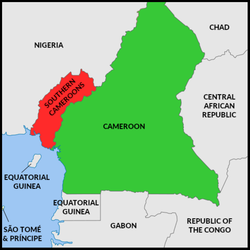Ambazonia
Ambazonia, officially the Federal Republic of Ambazonia is a secessionist state of Cameroon, self-proclamed in its English-speaking regions. De facto, Buea is the capital. It is bordered by Cameroon to the east, Nigeria to the west and Bioko island to the south east on the Gulf of Guinea.
Federal Republic Of Ambazonia Amba Land | |
|---|---|
| Motto: One Nation One Destiny Under God | |
| Anthem: Hail! Hail! Hail This Land of Glory | |
 | |
| Status | Unrecognized state Internationally recognized as part of Cameroon |
| Capital | Buea |
| Largest city | Bamenda |
| Official languages | English |
| Other languages | Cameroonian Pidgin English, Grassfields languages, Oroko, Akoose, Kenyang |
| Demonym(s) | Ambazonian |
| Government | Federal republic |
| Sisiku Julius Ayuk Tabe | |
| Independence from Cameroon (declared) | |
| Area | |
• Total | 43.700 km2 (16.873 sq mi) |
| Population | |
• 2015 estimate | 3,521,989 |
| Currency | AmbaCoin |
| Driving side | right |
Until 1961, Ambazonia was a British-controlled territory known as the Southern Cameroons, while the rest of Cameroon was French-controlled. At independence, a referendum was held and the voters of the Southern Cameroons chose to join Cameroon as a constituent state of a federal republic known as the Federal Republic of Cameroon. Over time, the power of the central government, dominated by French-speaking Cameroonians, has spread to the disadvantage of the region's autonomy. Many residents identify themselves as Anglophones and resent what they perceive as discrimination and the attempts of the Cameroonian government to eradicate Anglophone legal, administrative, educational and cultural institutions.
In 2016 and 2017, a demonstration was met with a violent government repression, which resulted in riots and violence against the security forces and, in 2017, a one-sided declaration of independence by the Ambazonian leadership.[1] The violence escalated into guerrilla warfare and, since 2021, clashes have continued, with population centres and strategic locations largely controlled by the government engaged in counterinsurgency actions, while large parts of more isolated rural areas are controlled by the separatists and used to launch guerrilla attacks. Ambazonian forces have found it difficult to form a united front, and internal conflicts have obstructed efforts to negotiate with Cameroon or to establish control over the various militias involved in the war.[2] Ongoing violence has led to widely reported human rights abuses by both sides, including indiscriminate killing of civilians, torture, rape and gender-based crimes, and unjustified detentions and kidnappings.[3]
Administrative structure
changeAmbazonia is divided in 13 counties who each have their own capital [4] and 61 Local Government Areas (LGAs).
- ↑ "Who are Cameroon's self-named Ambazonia secessionists?". DW. 30 September 2019. Retrieved 2020-01-07.
- ↑ Briefing: Cameroon's intensifying conflict and what it means for civilians, The New Humanitarian, 6 February 2020. Accessed 18 August 2021.
- ↑ "Cameroon: Events of 2019". HRW World Report 2020: Rights Trends in Cameroon. Human Rights Watch. 10 December 2019. Retrieved August 18, 2021.
{{cite book}}:|website=ignored (help) - ↑ "Counties". AmbazoniaGov. Archived from the original on 2020-04-14. Retrieved 2022-01-07.
